Peter MALONE
Saturday, 18 September 2021 19:27
Baby Love
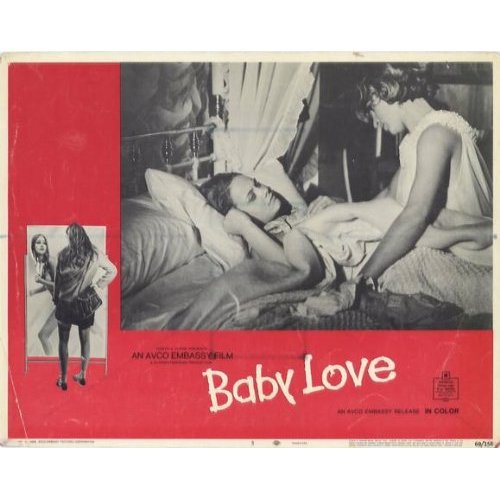
BABY LOVE
UK, 1968, 98 minutes, Colour.
Keith Barron, Vernon Dobtcheffl, Diana Dors, Dick Emery, Patience Collier, Linda Hayden, Bernard Miles.
Directed by Alistair Reid.
Baby Love is a rarely-seen British film of the late 1960s. It is quite striking – even shocking – when looked at in later decades. There is a greater consciousness about relationships of adults with teenagers, especially under-age.
The film focuses on a young girl, Lucy, played by Linda Hayden (who appeared in a number of the Confessions sex comedies in the UK). The lead is character actor, Keith Barron. There is a British supporting cast which includes such actors as Dick Emery and Bernard Miles.
The focus is on a fifteen-year-old who lives in inner London, whose mother commits suicide. When she is taken in by the former lover of her mother and his family, she infiltrates herself into the confidence of each of the members of the family, seducing them, father, mother, son.
The film is fairly explicit in its presentation of this theme.
At this time, there were a number of films about strangers who entered into families and disrupted them, especially by sexual seduction: Joe Orton’s Entertaining Mr Sloane, Harold Prince’s Something For Everyone and Pier Paulo Pasolini’s Teorema.
Director Alastair Reid made such feature films as The Night Digger and Dr Jekyll and Mr Hyde (1981). However, his main work over several decades was in television including the miniseries Traffik and two of the Inspector Morse films.
1. What genre of film was this? Human drama, thriller? How real was its presentation? How symbolic the characters and their behaviour?
2. The importance of the English background, atmosphere and style, locations, the minor characters? Did this add to the meaning of the film?
3. The impact of the opening, the build-up of the mother, her suicide? The importance of this initial impact for her re-appearances and influences on Luci?
4. The film's focussing on Luci? The significance of the title? Luci as a schoolgirl, the scene with kissing the boys, her relationship with her mother, the hold of the mother over her, her later wanting her mother to have loved her? How responsible was her mother for Luci's strange behaviour?
5. The film's filling in the background of the mother and her character? Her letter to Quayle?
6. How were the Quayles presented as an ordinary English couple? Their style, wealth, home, their son, the quality of their marriage, their social life etc.? The impact of Luci in this life?
7. How well did the film present Luci as a complex character? Her strange dreams, imagining of her mother, locking herself in etc.? The childlike nature of Luci as grateful, buying the clothes, the outings? The strange impact on her of the change of lifestyle, class etc.?
8. Luci as an adolescent girl, the growing sexuality? Was her character credible, the nature of her obsession with her mother?
9. The film's illustrating her hold over the family, her flirting with Nick, approaching him in the shower and injuring him? Her enticing of Amy and the lesbian response? Her toying with Robert, wanting his approval? Slashing him with the fork, forcing his hand to own his infatuation? Did this hold that she had over the family make sense? How sinister?
10. What was the audience left with as Luci illustrated her power, dressed herself up in evening dress and makeup, her close-ups and the film ending with her face? Was this an interesting exploration of human values?
Published in Movie Reviews
Published in
Movie Reviews
Tagged under
Saturday, 18 September 2021 19:27
Below
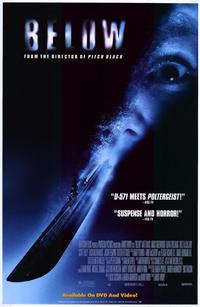
BELOW
US, 2002, 100 minutes, Colour.
Matt Davis, Bruce Greenwood, Olivia Williams, Dexter Fletcher, Jason Fleming, Scott Foley.
Directed by David Twohey.
Another movie in the submarine genre. In more recent years we have had Crimson Tide and U 571. Below is also set in World War II, in the North Atlantic. A submarine picks up three survivors from their attack on a German ship. All is not as it might seem. The captain has died during the attack, one of the prisoners is German while the other two are English - and then the crew start to hear voices and mysterious things go bang in the night.
The authentic war situation gives the film some edge, but it does not generate the tension that audiences would be expecting. Writer-director, David Twohey took on a similar kind of story with his journey to Mars tale, Pitch Black, in which the vehicle travelling through space becomes haunted and the crew gradually diminishes. That film was literally dark and mysterious. So is the world below. Maybe the blend of realism and horror does not quite gell.
The cast looks earnest, Bruce Greenwood as the man in charge, Matt Davis as the hero who, we know, will save the day or, at least, try to, Olivia Williams as Miss Page, a nurse rescued from a hospital ship.
The achievement with this one is not as successful as the intentions.
1. The popularity of submarine films? Claustrophobia, danger? Combined with the sense of the haunted ship? In the context of World War Two?
2. The sea locations, undersea, the sinking of the ship? The interior of the submarine, a sense of confined space? The dangers to the submarine? Special effects? Musical score?
3. The title, the indication of the world of the submarine, normality at the surface, people trapped below?
4. The situation of the submarine, the North Atlantic, the American submarine, the sinking of the German ship? The attempts to get back to the United States? The reality of the story, the sinking of the British hospital ship, the rescue of the three survivors? The issue of the shooting of the survivors in the water, the stance of the captain, the stance of the three officers? The death of the captain, the writing up of the log, the cover-up, what the three officers had to lose in terms of promotion? The consequences and the submarine being haunted?
5. Bryce, being in control, seeming to be a good captain? His attitude towards the men, the officers? The three survivors? The clash with Miss Page? Confining her to cabin? Their not telling him about the German patient? The killing of the German? The seeming haunting of the ship, the depth charges, the sonar? The hooks on the submarine? His growing tension? The dangers, the decisions, his surliness? The log book, his version of the truth? The growing danger, the death of the officers? The confrontation with O'Dell? The surfacing, his not wanting contact with the passing boat? The confrontation with Miss Page, his shooting himself? The other officers, their role on the ship, their work, personalities? Interactions? Their deaths, being afraid, seeing ghosts?
6. O'Dell, the assistant, his not being involved in the killings? His work on the ship, relationship with Miss Page, with Kingsley? Studying the map, wanting to get to England? Wanting to take over the ship, dominated by Bryce? The mending of the ship, the death of the officer, his sense of fear? The finale, trying to contact the British ship? Surviving?
7. Miss Page, the nurse on the ship, surviving, the German as her patient, his being shot? Her being confined, going out, reading the log? The confrontation with Bryce? Her teaming with O'Dell, the help of Kingsley? Getting the hysterical sailor under control - especially after his misbehaviour towards the dead body? Surviving?
8. The British man, his skills, confined, helping with reading the map, his death?
9. The officers and crew, the two men and their putting the stick in the mouth of the dead man, their hearing the ghostly voices? Hysteria, helping to fix the submarine, being slapped by Miss Page? Surviving?
10. The atmosphere of the haunted ship, the sounds, the voices, Benny Goodman starting to play? The hooks on the submarine? The other sailors and their explanations in a realistic and credible way? The sense of the ominous, the deaths of the officers, the lowering of the air, the hydrogen, the deaths of all the sailors?
11. How well did the various ingredients combine - war action, confined submarine life, survival, ghosts? The theme of maledictions and the people who are cursed somewhere between Heaven and Hell - this film as a purgatorial experience for the crew?
Published in Movie Reviews
Published in
Movie Reviews
Tagged under
Saturday, 18 September 2021 19:27
Bonjour Balwyn
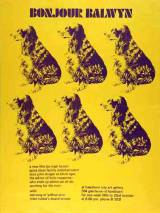
BONJOUR BALWYN
Australia, 1972, 60 minutes, Colour.
John Duigan, Peter Cummins, John Romeril, Barbara Stephens, Alan Finney.
Directed by Nigel Buesst.
Bonjour Balwyn is one of several short features made by writer, director, photographer Nigel Buesst in the early 70s - Jacka V.C., The Rise and Fall of Squizzy Taylor, Dead Easy, Come Out Fighting. Buesst was not so active in the late 170s - concentrating rather more on documentary: Jazz Scrapbook (1982). Buesst was an influential teacher at Melbourne's Swinburne Institute of Technology.
The film reflects attitudes of the late '60s-early '70s (compare Three to Go). With its strong Melbourne setting, the film focuses on Kevin Agar, who is critical of his suburban home-life and his parents' work and tries to edit an avant-garde magazine. The incidental characters are well-drawn. Writing was by playwright John Romeril with Buesst and actor later director (Mouth to Mouth, Winter of Our Dreams, Far East) John Duigan. Cameraman was photographer-director Tom Cowan and editing was by Buesst and documentary and short film director Peter Tammer. There is also a strong cast including Peter Cummins.
While the film may seem very much of its time now, it is interesting to see the influences which led to the Australian film renaissance of the 1970s and 1980s.
1. The work of Nigel Buesst in the '60s and '70s? Indications for a film revival?
2. Black and white photography, authentic Melbourne atmosphere and locations, the feel of the '70s? Pace and editing? The set pieces for example the interview with the theatre producer, the repossessing of the television sets?
3. An effective short story? Entertainment and interest? Mirroring the times? Satire and critique? The viewpoint of the film-makers about Australian society?
4. The presentation of middle-class families in the '70s? The ironies of the title? Kevin's parents, the meal, the visitors and the talk about the Japanese? Financial interests and work? Yet the tolerance of Kevin's father? His friends and their parents and money? The reliance on money for the production of the magazine?
5. Kevin in reaction against his parents? Appearance, hair, clothes, style? His options? Joining a counter-culture? His work? Interest in the arts? Social questions? The articles with critique of boring suburbs and cities? The importance of money? His own business sense and treatment of his colleagues, secretary? Problems of money? Trendiness? The validity of his points of view?
6. Kevin in himself: surly, reaction to his parents,, his leaving home? His office, interview of his secretary and employing her? The paying of the bills? The discussion with the printers? Phone calls? Gathering of articles? Hi s bringing Rhonda and the outing with her, discussion about her marriage? Joanne and her clients? Friendship with Christine, genuine feeling, love? The outing in the country and his singing in the country? The greyhound races, bets, his being bashed in the street? His friends and their collaboration? Their not pulling their weight with the magazine, his disillusionment? The need for money? His joining the TV repairman in repossessing? His skill in performing, satire, mime? His various guises at the door for repossessing? His participation in the robbery? In himself, the quality of observation in the character, his place in the world of the '70s, protest? His being caught, trapped?
7. The others working on the magazine? Trendiness? The range of the magazine - the visit to the news-store owner? Their help? Chatter? Yet the magazines in the boot of the car etc.? Kevin's reaction against them?
8. The interview with the secretary, her choice of the job, her devotedness to Kevin, the outing with him, her final stand about the money?
9. Joanne and her clients? Friendliness? Christine and her retiring attitudes, breakfast in bed for Kevin, the outing? Possibilities for him?
10. Phone calls and discussions about contracts, discussion with the printer, the printer demanding his money and the cheque?
11. The interview with the theatre producer - and his mouthing trendy attitudes, getting the audition couple to strip, the homosexual tone? The humour and irony?
12. The TV repairman and his techniques? The robbery? A jovial conman?
13. A portrait of part of Melbourne in the early 1970s? Local colour? Insight? The attitudes and the film-making in retrospect?
Published in Movie Reviews
Published in
Movie Reviews
Tagged under
Saturday, 18 September 2021 19:27
Breakfast for Two

BREAKFAST FOR TWO
Iran, 2004, 107 minutes, Colour.
Directed by Mahdi Sabbaghzadeh.
Breakfast for Two is a rather novelettish title for a film about creative writing. The film focuses on a middle-aged author with writer's block, showing in detail his life at home. When doing tai chi exercises in a park, a young girl with a suitcase bumps into him. His curiosity is roused and he follows her. The journey leads him into his own reality as a writer as well as a fantasy of writing her story. The plot is convoluted, sometimes difficult to assess what is reality and what is creative fantasy - and the same happens for the author himself.
It emerges that the young woman has written her story, is pursued by a man who loves her, is possibly murdered or kills herself (or neither) and is often seen leading the writer on so that he will tell her story. The writer also visits his mother, the young man who loves her, goes to his publisher who, it seems, might have set the whole thing up. He is also involved in the police as he acts like a detective to try to find out what has happened to the young woman.
He becomes infatuated with the woman, she leading him on, disappearing from him. Eventually, they talk - although this may be the novel itself. Back in his home, writing creatively, she appears at the breakfast table, also disappearing. A film about writer's block, imagination, creativity.
1. The appeal of the film? The story of the writer? The mystery of the young woman, her disappearance, her story?
2. The writer's home, the open road and the desert, villages, hotels, his mother's house? The reality of the story? The reality in the fantasy world?
3. The title, the culmination in happiness of the writer's quest?
4. The portrait of the writer, his block, the exercise in the park, the young woman, her pursuer? His curiosity? His phone calls to the publisher? Driving out of the city, visiting his mother? The memories of his childhood, where he played? His father? The visual style of the flashbacks? His glimpsing the young woman at the hotel, at the café? Asking people about her, pursuing her, the hotel, the outline of where the dead body was? Finding the young man, his playing his instrument, the discussion? The young man pursuing her? The various pieces of the puzzle, coming together in the story of the young woman and why she wrote her life, her relationships? Her world-weariness?
5. The writer, his involvement in her life? The manuscript? His wanting to write? His visit to his mother, the return home? His writing, the young woman's appearing at the prepared breakfast table?
6. An imaginative look at the torments of writer's block, of the flights of fantasy for creative writing?
Published in Movie Reviews
Published in
Movie Reviews
Tagged under
Saturday, 18 September 2021 19:27
Billy Liar
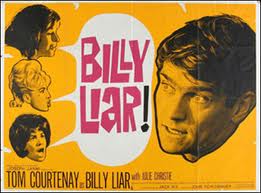
BILLY LIAR
UK, 1963, 98 minutes, Black and White.
Tom Courtenay, Julie Christie, Mona Washbourne, Wilfred Pickles, Rodney Bewes, Finlay Currie.
Directed by John Schlesinger.
Billy Liar is from a play by Keith Waterhouse and Willis Hall, a comedy, which, by the end, turns rather serious in implication. It is in the tradition of the suburban British kitchen-sink dramas of the early 60's.
John Schlesinger's previous film was A Kind of Loving. The next was to be Darling. Later films were to be Far From the Madding Crowd, Midnight Cowboy, and Sunday, Bloody Sunday. Here Schlesinger uses his talent for realism along with some fancy, fantasy sequences.
Tom Courtenay is excellent as Billy, one of his many brilliant performances. Julie Christie, soon to win an Oscar 1n Schlesinger’s Darling, made a striking impression in a short sequence where she walks down a street.
There are many fine observations on British life and people, some good satire. The ending is sad as Billy decides to remain in his fantasy world.
1. Why the title?
2. What was the effect of the credit-sequences; the BBC, suburbia, Godfrey Wynne and housewives' songs? How well did this establish the setting of the film and its British theme?
3. How typical a modern young man was Billy - or was he a caricature, or perhaps an exaggeration of what many young men think and feel?
4. Did you like Billy? Why?
5. What did you think of his parents? Were they typical or caricatures? Why? Did they help Billy at all? What did they offer him? Did they drive him into fantasy?
7. How irresponsible was Billy as regards his girlfriends, especially concerning the ring (and Barbara's and Rita's fight) and avoiding them? Why had he allowed himself to get into this dither? Did he have any genuine feelings for them?
8. What role did Liz play in the film? How well done was the famous Julie Christie walk, down the street? What part did it play in the film, in establishing Liz's character? The Danny Boons opening?
9. What influence did Liz have on Billy? Did he like her? Love her? How did she encourage him e.g. his song at the dance? Her honest talk?
10. How much truth was said in their talk in the park - being invisible, living in another world, etc? How much was concession to fantasy? (What was the effect of his friend's overhearing it? Why?)
11. How telling was the sequence when Billy is told off by his Dad? How did you feel? Was the father right? Was this the way to handle Billy?
12. What of his relationship with his mother? His grandmother’s death? Did his mother encourage him?
13. Were you glad he decided to go to London with Liz? Did she give him good advice? Did you think he would turn up? Why?
14. Why did he avoid leaving? Why couldn't he have done it directly instead of pretending about the milk? Were you sorry he did not go? Why?
15. What future did he have? Did he surrender and go into his own world? Was he sane at the end?
16. Did writers and directors intend to say that modern British suburban life, style end pressures do this to its youth? Did they say this? How optimistic is this film about the Billy Liars end potential Billy Liars of this world? Why?
Published in Movie Reviews
Published in
Movie Reviews
Tagged under
Saturday, 18 September 2021 19:27
Bedford Incident, The
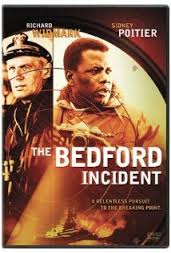
THE BEDFORD INCIDENT
US, 1965, 105 minutes, Black and White.
Richard Widmark, Sidney Poitier, Martin Balsam, Eric Portman, James Macarthur.
Directed by James B, Harris.
The Bedford Incident looks like a navy action-suspense story most of the time, but it has a swift, alarming ending which fits it into the nuclear scare category of films from 1962 to 1965 which include Panic in Year Zero, These are the Damned, Failsafe, Dr. Strangelove and Seven Days in May. The Bedford Incident is more straightforward than these and makes an important but plain point - that the responsibility for decisions which involve men's lives can never be put into the hands of single-minded fanatics. Tense, automatic and unquestioning discipline without balanced humane living of life makes a man a machine that can accidentally misfire. Richard Widmark portrays the dangerous Captain well. Sidney Poitier has really little to do as a journalist aboard the Bedford. Martin Balsam adds another effective character role to his repertory.
A minor, but sufficiently effective, film.
1. Was this a realistic film or was it far fetched? Why?
2. What was the point behind the film or was it merely a story?
3. Did the Captain run the Bedford efficiently? Did he run it well?
4. Was the Captain really as hard as he was made out to be?
5. Is such policing and spying as the Bedford was engaged in necessary during peace-time? What were its aims?
6. Why did the journalist apply to Join the Bedford for his background to an article? What interested him about the Captain?
7. What motivated the Captain? Was he anti-Communist? Why did he take a strong outspoken line? (Why had he been passed over for Admiral?) Why was he suspicious of others?
8. Was the Captain a fanatic? Why did he enjoy the hunt? (Contrast the other officers, the Commodore, the doctor, the journalist.)
9. Was the Bedford crew too tense? Did they need exercise and recreation programmes? Why was no one ever sick?
10. Why did the officer fire the rocket? Who was to blame? (Was this situation prepared for during the film - the Captain's treatment of the officer - cutting him down to size, his tense glances, and automatic, unthinking carrying out of orders, the collapse of the radio operator, the clash with the doctor)?
11. The Commodore said of the submarine crew that desperate men were forced to do reckless things. How was this true of the Bedford? Why did the Captain look so bewildered at the end?
12. Why was there no evasion procedure prepared for torpedo attack?
13. What comment on the world's nuclear situation and tensions did the end of the film make?
14. What did it reveal about the type of man needed for this kind of situation and the need for balance instead of paranoia and fanaticism?
15. Is this nuclear parable still valid to-day?
Published in Movie Reviews
Published in
Movie Reviews
Tagged under
Saturday, 18 September 2021 19:27
Bonnie and Clyde

BONNIE AND CLYDE
US, 1967, 107 minutes, Colour.
Warren Beatty, Fay Dunaway, Gene Hackman, Estelle Parsons, Michael J. Pollard, Gene Wilder, Denver Pyle.
Directed by Arthur Penn.
Bonnie and Clyde created critical controversy when it was first released. It did not receive favourable reviews from 'Time' or 'Newsweek'; later in 1967, we had the unusual sight of these magazines retracting their first impressions and hailing the film as a breakthrough.
It is easier now to appreciate Bonnie and Clyde and see it in perspective. It certainly heralded a trend of showing violence as violence and making people respond in some ways to it - we have since had Peckinpah's The Wild Bunch and violent but sensational imitations. It also highlighted the interest in (and myths about) criminals who seem so different yet work well together - the most famous cinema couple now being Butch Cassidy and the Sundance Kid.
The period is excellently recreated in Bonnie and Clyde and the two emerge as characters of their time, Depression, cars, banks, police etc. Arthur Penn has shown skill in portraying facets of America's self-understanding - especially in The Chase (1966), Alice's Restaurant (1969) and Little Big Man (1970). Bonnie and Clyde fits into this series.
The film, Penn, Warren Beatty, Faye Dunaway and Estelle Parsons were all nominated for 1967 Oscars, with Estelle Parsons winning as Best Supporting Actress.
Bonnie and Clyde is now something of a classic. It is interesting to note that the National Catholic Film Office in the United States gave it its prize for Best Picture of the Year for adults.
1. Were Bonnie and Clyde hero and heroine of the film? were they presented sympathetically or unsympathetically? a good thing? Why? How did the film differ from routine gangster films?
2. How was the atmosphere and influence) of the times evoked - the photographs during the credits, the romantic song, the banks, depression cars, highways, Bonnie 's Watching the movies, fashions?
3. What made Clyde Barrow 'tick'? How could you reconcile his boyish vanity, cops-and-robbers' mentality and his callous killing of so many people? Was he a typical American gangster?
4. What made Bonnie Parker 'tick'? Was she anything more
than a glamour-hungry waitress, wanting thrills, sensuous and fulfilling love; why did she kill?
5. How did American society produce -its Bonnies and Clydes? What had American violence, the depression (and the song 'We've in the money'), the glorification of guns and good shots to do with Bonnie and Clyde 's careers? Did Bonnie and Clyde meet with society's admiration for those who defy the law? (What of the kidnapping of Gene and Velma and inviting them to join the Barrow gang?)
6. What was the significance of and emotional direction behind the sequence Where the farmer joins Bonnie and Clyde and the black, Davis, in shooting the house the bankers have taken from him? 'We rob banks'?
7. Why did Bonnie and Clyde humiliate Frank Homer? Were they malicious or joking? Why did he continue to pursue them?
8. Why did Buck and Blanche (especially with her background) join the Barrow gang?
9. Why was the sequence of Bonnie 's visit to her mother hazily photographed? What atmosphere did the whole scene have? How did it bring home the fact that they had no home?
10. What role did C.W. Moss play? Why did his father take the gang in? Why did he betray them? Why did C.W. Moss not warn them?
11. Was Homer's treatment of the bandaged Blanche too cruel? Why?
12. Was Bonnie's poem of Bonnie and Clyde a good one? How significant was it? Was she a poet? Why did she publish the poem? Why was Clyde grateful for it? What did it do for him - immortalise him? What did it contribute to the consummation of Bonnie and Clyde's love? What was the significance of Clyde's previous impotence?
13. Was the final shooting too violently portrayed? Did it shock you? Did it shatter your previous impressions of the couple? Was the whole film too violent (the 'exhilaration' of violence)? Why?
Published in Movie Reviews
Published in
Movie Reviews
Tagged under
Saturday, 18 September 2021 19:27
Butch Cassidy and the Sundance Kid
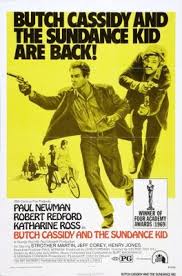
BUTCH CASSIDY AND THE SUNDANCE KID
US, 1969, 107 minutes, Colour.
Paul Newman, Robert Redford, Katharine Ross.
Directed by George Roy Hill.
Butch Cassidy and The Sundance Kid seems to have been everybody's favourite film for 1970. Its theatre runs were extraordinary in their popularity and length.
The film has everything going for it: popular stars, western action and comedy, a very witty screenplay, Burt Bacharach music and 'Raindrops Keep Falling on My Head'. (The music won an Oscar.) As popular and pleasing entertainment, the film is hard to beat. For discussion, it is interesting in its lighter presentation of the breaking of the myths of the glamour of the West and its passing, (Compare Tell Them Willy Boy 1s Here, The Ballad of Cable Hogue, The Wild Bunch, The Good Guys and the Bad Guys). It is in the fashion of the late 60's of the duo group of heroes or heroic villains, the most famous, of course, being Bonnie and Clyde. The film is stylish in its literate script by William Goldman, in its photographic effects from the opening silent film to the sepia and white Mew York photos and Conrad Hall's photography of the Western landscapes. The musical effects enhance the film considerably the Raindrops/bicycle sequence, the New York holiday music with its plaintive refrain used also for the credits and the chorus work for the Bolivian chases.
George Roy Hill has made such films as The World of Henry Orient, Toys in the Attic and Hawaii,
1. The film was based on a legend of the Hole in the Vail gang. Did it try to break the legend or prolong it?
2. What was so attractive about Butch and Sundance?
3. What kind of man Was Butch - he had vision while the World wore bifocals; he dreamed as a boy that he would grow up to be a hero; he did the thinking and had never shot a man before Bolivia; he was a soft touch, generous and never ahead with money; he -ran the gang, was tough yet humorous, likeable but without a steady girlfriend?
4. What kind of man was Sundance? - action, laconic, friendly, loving Etta, following Butch's orders, tough yet obedient?
5. Why did Etta follow them? 26, single, a schoolteacher, at the bottom of the pit, the only excitement she had was with them. Why did she say she was unwilling to see them die?
6. What was the purpose of showing silent film style during the credits and the lengthy opening of Butch and Sundance as persona and in action in sepia and white?
7. Were Butch and Sundance tough criminals and ruthless - how did they react to their pursuers, in the actual robberies?
8. What was the purpose of the bike ride with Etta? What effect did it have in the film along with the songs? Paul Newman showed Butch as infectiously happy. Did this sequence endear Butch to the audience?
9. Why was the sequence with the sheriff so strong? He said they, were two-bit outlaws in changing times. Their day was past. Was he right? Is that why they were pursued and had to go to Bolivia?
10. Did you like the New York sequence? Why? How effective were the stills? What did they communicate as regards atmosphere? Were the three happy? How did the change of pace of musical theme on the boat alter the mood? Butch ate at the table while the others danced. Was he a loner?
11. Were they a success in Bolivia? Why were the robbery scenes so funny?
12. How did the shooting of the payroll robbers affect them? Why did Etta leave?
13. What was the impact of the final shooting, their courage, quips, dreams of going to Australia, "I thought we were in real trouble, go" and the final still?
14. How heroic did the final still make them? - never giving up, two against a thousand, a legend?
15. Why was the film so entertaining - the stars, the Western ingredients, the music, the witty dialogue?
16. How was the music used to good effect? How did it give the tone to the sequences:
- the bike scenes
- the New York sequences
- the Bolivian pursuits?
17. Was the film a glorification of the West? A criticism of its myths?
Published in Movie Reviews
Published in
Movie Reviews
Tagged under
Saturday, 18 September 2021 19:27
Breakfast at Tiffany's

BREAKFAST AT TIFFANY'S
US, 1961, 115 minutes, Colour.
Audrey Hepburn, George Peppard, Patricia Neal, Buddy Ebsen, Martin Balsam, Mickey Rooney.
Directed by Blake Edwards,
Breakfast at Tiffany's is based on a story by Truman Capote. The main character Holly Golightly has become famous as a kooky type - the transformed hillbilly girl who is a genuine phoney, aping the mannerisms of New York till they are really part of her. The kook is a person of surface eccentricity, gaiety, happiness masking insecurity and a longing for stable happiness,
Many sequences in Breakfast at Tiffany's are eccentric: the opening sequence, the party, Holly's and Paul's day out in New York. But the mood of the film changes from irresponsible gaiety and phoney living it to pathos for the girl who wanted to be someone and to be loved. By the end of the film, there is a sense of real feeling. The film takes our responses quite some way.
The adaptation of Capote's story was made by George Axelrod, writer (and sometimes director) of eccentric and imaginative comedies like The Seven Year Itch, Paris when it Sizzles, Lord Love a Duck, The Secret Life of an American Wife. Audrey Hepburn seems to fit the part eventually. She is always better at pathos than comedy. George Peppard is very good as the writer, Paul Barjak. There are good supporting roles by Patricia Neal and Buddy Ebsen and an out of place Japanese caricature by Mickey Rooney.
Director is Blake Edwards - famous for The Pink Panther, A Shot in the Dark, The Great Race. Altogether, Breakfast at Tiffany's is an entertaining experience of the surface life of the 20th century city, the phoney who is innocent and the slightly-soiled contemporary Prince Charmings who rescue maidens into human feeling. Audiences wondered at the time of release, but it makes sense now.
1. What impression does the sequence behind the credits make? What mood is set - dawn, 5th Avenue, city, Tiffany's, jewels, evening dress, breakfast bags, eating, dark glasses?
2. What did you think of Holly Golightly when we first meet her - likeable? eccentric? irresponsible? $50 for the powder room, cavalier attitudes to her landlord?
3. The sequence from Paul's knocking at Holly's door, her awakening, chit-chat (about the cat and Sing-Sing), dressing, finding shoes, and then emerging glamorously for Sing - Sing. What did it reveal about Holly? About Paul?
4. Did you like Paul? As a person? In his relationship with hie lover? (What kind of woman was she?) How normal was he? How irresponsible and dependent?
5. Why did Holly like him - her visit to his room, thinking of him as Fred, her fear and need for support?
6. The Party - how typical of New York? What did it show of Holly's character? Was she genuine or was she phoney? Berman says she is a genuine phoney - she did all these things with affectation but not with affected intent?
7. What was the role of the cat? Why did it have no name? Note, Paul's book was Nine Lives)?
8. What was the meaning of Holly's having breakfast at Tiffany's? How did she explain it? (The 'mad reds')? Why did she need it? How did her singing of "Moon River" fit into this theme?
9. How much was New York part of her life and atmosphere? The day she and Paul spend together - the streets, shoplifting, the masks?
10. How did the Doc episode change the mood of the film? Comment on how it changed audience knowledge of and attitude towards Holly (although Berman had given some clues earlier), on Holly as a 'wild thing'. How did the episode affect Paul - especially going to the bus with her?
11. What decision did Holly make by not going with Doc?
12. Why did Holly have such ambition to marry money? Why was she so serious (and so callous to Paul) about it?
13. Was her reaction to Fred's death reasonable? Why?
14. Why did Holly act as she did when arrested – odd kookiness and people noticing her or what?
15. How attached had she been to going to Brazil? Why did she not respond to Paul in the taxi?
16. What did Paul mean by telling her that, although she was a 'wild thing', she was not free, that she did not belong to herself but was keeping herself in her own prison?
17. The final sequence - was it sentimental? Why was the cat brought into it? Why was it done in the rain?
18. How typical were Holly's basic attitudes (not necessarily behaviour) of modern city girls and their preoccupations and ambitions?
Published in Movie Reviews
Published in
Movie Reviews
Tagged under
Saturday, 18 September 2021 19:27
Bob and Carol and Ted and Alice
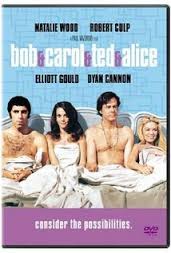
BOB AND CAROL AND TED AND ALICE
US, 1969, 103 minutes, Colour.
Natalie Wood, Robert Culp, Elliot Gould, Dyan Cannon.
Directed by Paul Mazursky.
Bob and Carol and Ted and Alice is the first satire on the group dynamics and sensitivity therapy that boomed in the United States at the end of the 60's. People who have group dynamics very seriously at heart might well be advised to keep away because some of the humour is heavy parody. The film opens with the Hallelujah chorus booming over the southern California hills and finally alighting on lady sunbathers at the film's equivalent of the Esalen institute. The first twenty minutes or so then give us a hilarious rendition of a session.
Bob and Carol are a typical Southern California couple who are so taken by their sensitivity weekend that everything is 'beautiful', even the confiding of extra-marital affairs to one's spouse and to one's closest friends. Ted and Alice are a more down-to-earth couple, but by the end of the film they are also caught up in the aura of sensitivity. The film ands with a sugary whimper as the couples, who after a wife-swapping failure, see a little more in life; they process to Burt Bacharach's 'What the world needs now is love, sweet love'. Many Americans found the film far too mocking; however, it is a hilarious send-up of pseudo-psychological pretensions. It is real adult comedy, concerned solely with an adult world and its problems.
Natalie Wood and Robert Culp were sufficiently bland for Bob and Carol; it is Elliot Gould and Dyan Cannon who stand out as Ted and Alice. This was the first film of team Larry Tucker and Paul Mazursky. There second was Alex in Wonderland (1970) where Donald Sutherland plays a director looking for a subject for a second film. It is a Hollywood 8 1/2, imitating and actually introducing Fellini. It was a comedy for those interested in film industry and not popular at the box-office. However Bob and Carol and Ted and Alice certainly was.
1. What are the targets of the satire of this film?
2. Was the satire and parody handled well? Laughter without despising the targets or did the film caricature and mock so that any values in what was satirised were lost?
3. Why were the first -twenty minutes or so eo funny? Did the "Hallelujah Chorus" and the Californian mountains blend to make audiences laugh at the group therapy? What kind of mood did the Handel music create?
4. Was the group therapy funny? eg, names, looking at one another, consoling one another in a heap? What is valuable about this kind of experience?
5. What effect did the weekend have on Bob and Carol - how did the restaurant scene show this ('Carol's thank you's in the kitchen)? How did the couple contrast with Ted and Alice who were normal?
6. What was being satirised in Carol's reaction to Bob's 'beautiful' affair? Did this 'honesty' really bring Bob and Carol closer? What was Bob's reaction to Carol's affair with the tennis player?
7. Why was Alice upset by these revelations?
8. What was the point of the long humorous sequence where the amorous Ted is trying to enthuse the tired Alice?
9. Bob and Ted talk about affairs at the pool? How do Ted's attitudes change? Why? Why does he daydream and have an affair?
10. Why was Alice worried by all this? Why does she go to a psychiatrist? What is the effect of psychiatry on her?
11. What is the point of the attempted orgy? What did they think they were going to achieve? Why did Ted look so sheepish and think it was, wrong? Why did it fail?
12. Was the procession ending and the Bacharach text - "What the world needs now is love, sweet love" satisfactory? Did it really contribute anything to the significance of the film?
13. Was the film something of an invasion of privacy, especially of marriage and of psychiatric therapy?
14. What insights did the film give? Was its satire effective?
Published in Movie Reviews
Published in
Movie Reviews
Tagged under